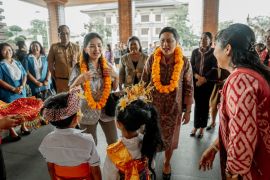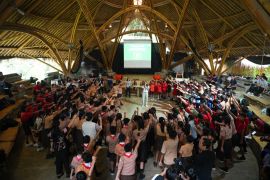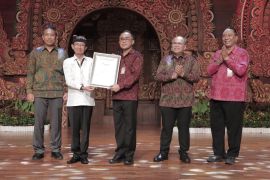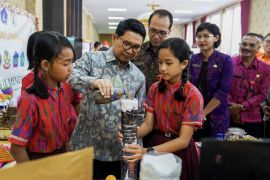Jakarta (Antara Bali) - Education and Culture Minister Mohammad Nuh has announced that the Indonesian government will contribute $10 million to support the activities of UNESCO which is financially experiencing difficult times.
The announcement was made during the first official visit by UNESCO Director-General Irina Bokova to Indonesia, the UNESCO Jakarta Office said on its official website, Thursday.
The UNESCO Director-General opened the 6th session of the Intergovernmental Committee for the Safeguarding of Intangible Cultural Heritage which is being held in Bali from November 22 to 29, 2011.
The Director-General also met with the Coordinating Minister for People's Welfare Agung Laksono and the Minister of Tourism and Creative Economy Mari Elka Pangestu.
The Director-General expressed her gratitude for this significant and timely contribution, affirming that it would support UNESCO's core activities, including the preservation of heritage, capacity building and improving the quality of education.
A substantial part of the funding will be used for programs to support Indonesia and the ASEAN region.
During her stay in Bali, Irina Bokova visited the cultural landscape of Bali which has been proposed by the Indonesian Government for inscription onto the UNESCO World Heritage list.
The Director-General was accompanied by the acting Director General for History and Archaeology of the Indonesian Ministry of Tourism and Creative Economy, I Gede Pitana and the Director of UNESCO Jakarta, Hubert Gijzen.
The visit covered some of the proposed sites, such as Batukaru Temple, a unique and sacred mountain sanctuary, and the royal temple of Tabanan dynasty, located in the middle of a rain forest and beneath Mount Batukaru. This temple is one of the biggest Hindu temples in Bali and was built to worship the deities of the surrounding mountains and lake.
The DG also visited the Jatiluwih Rice Terraces, which are located in the Regency of Tabanan, about 700 meters above the sea level. The site is managed by an elaborate community-based traditional irrigation system, known as the 'subak' system, which symbolizes the Balinese Tri Hita Karana concept that binds gods, human and nature together.
The visit was followed by a visit to Taman Ayun Temple which was built in the 18th Century. The temple is influenced by both Balinese-Majapahit and Chinese styles, which gives it its uniqueness.
At the temple, the Director General's delegates received an on-site briefing and were welcomed by a Sekar Jepun traditional dance.
The Director-General commended the local community for its dedication.
"On behalf of UNESCO, I appreciate all you are doing to preserve your heritage for future generations. You are an excellent example of what Indonesia represents: a huge diversity, a dynamic country with long traditions; an impressive social and economic development that has reconciled heritage with modernity. I encourage you to protect and pass on this heritage to future generations," she said.(*)









